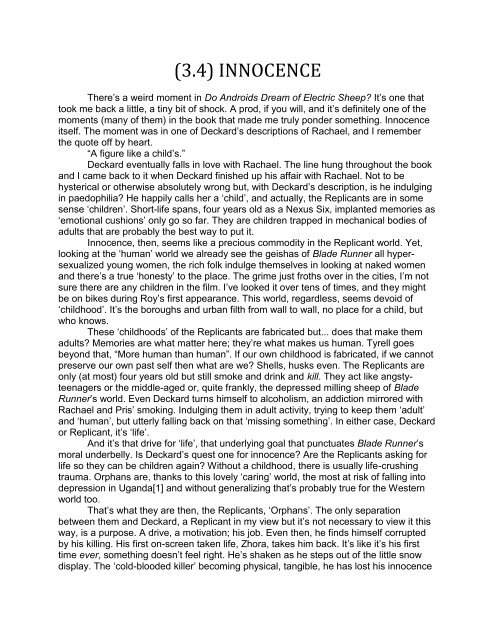tears-in-rain
tears-in-rain
tears-in-rain
Create successful ePaper yourself
Turn your PDF publications into a flip-book with our unique Google optimized e-Paper software.
(3.4) INNOCENCE<br />
There’s a weird moment <strong>in</strong> Do Androids Dream of Electric Sheep? It’s one that<br />
took me back a little, a t<strong>in</strong>y bit of shock. A prod, if you will, and it’s def<strong>in</strong>itely one of the<br />
moments (many of them) <strong>in</strong> the book that made me truly ponder someth<strong>in</strong>g. Innocence<br />
itself. The moment was <strong>in</strong> one of Deckard’s descriptions of Rachael, and I remember<br />
the quote off by heart.<br />
“A figure like a child’s.”<br />
Deckard eventually falls <strong>in</strong> love with Rachael. The l<strong>in</strong>e hung throughout the book<br />
and I came back to it when Deckard f<strong>in</strong>ished up his affair with Rachael. Not to be<br />
hysterical or otherwise absolutely wrong but, with Deckard’s description, is he <strong>in</strong>dulg<strong>in</strong>g<br />
<strong>in</strong> paedophilia? He happily calls her a ‘child’, and actually, the Replicants are <strong>in</strong> some<br />
sense ‘children’. Short-life spans, four years old as a Nexus Six, implanted memories as<br />
‘emotional cushions’ only go so far. They are children trapped <strong>in</strong> mechanical bodies of<br />
adults that are probably the best way to put it.<br />
Innocence, then, seems like a precious commodity <strong>in</strong> the Replicant world. Yet,<br />
look<strong>in</strong>g at the ‘human’ world we already see the geishas of Blade Runner all hypersexualized<br />
young women, the rich folk <strong>in</strong>dulge themselves <strong>in</strong> look<strong>in</strong>g at naked women<br />
and there’s a true ‘honesty’ to the place. The grime just froths over <strong>in</strong> the cities, I’m not<br />
sure there are any children <strong>in</strong> the film. I’ve looked it over tens of times, and they might<br />
be on bikes dur<strong>in</strong>g Roy’s first appearance. This world, regardless, seems devoid of<br />
‘childhood’. It’s the boroughs and urban filth from wall to wall, no place for a child, but<br />
who knows.<br />
These ‘childhoods’ of the Replicants are fabricated but... does that make them<br />
adults? Memories are what matter here; they’re what makes us human. Tyrell goes<br />
beyond that, “More human than human”. If our own childhood is fabricated, if we cannot<br />
preserve our own past self then what are we? Shells, husks even. The Replicants are<br />
only (at most) four years old but still smoke and dr<strong>in</strong>k and kill. They act like angstyteenagers<br />
or the middle-aged or, quite frankly, the depressed mill<strong>in</strong>g sheep of Blade<br />
Runner’s world. Even Deckard turns himself to alcoholism, an addiction mirrored with<br />
Rachael and Pris’ smok<strong>in</strong>g. Indulg<strong>in</strong>g them <strong>in</strong> adult activity, try<strong>in</strong>g to keep them ‘adult’<br />
and ‘human’, but utterly fall<strong>in</strong>g back on that ‘miss<strong>in</strong>g someth<strong>in</strong>g’. In either case, Deckard<br />
or Replicant, it’s ‘life’.<br />
And it’s that drive for ‘life’, that underly<strong>in</strong>g goal that punctuates Blade Runner’s<br />
moral underbelly. Is Deckard’s quest one for <strong>in</strong>nocence? Are the Replicants ask<strong>in</strong>g for<br />
life so they can be children aga<strong>in</strong>? Without a childhood, there is usually life-crush<strong>in</strong>g<br />
trauma. Orphans are, thanks to this lovely ‘car<strong>in</strong>g’ world, the most at risk of fall<strong>in</strong>g <strong>in</strong>to<br />
depression <strong>in</strong> Uganda[1] and without generaliz<strong>in</strong>g that’s probably true for the Western<br />
world too.<br />
That’s what they are then, the Replicants, ‘Orphans’. The only separation<br />
between them and Deckard, a Replicant <strong>in</strong> my view but it’s not necessary to view it this<br />
way, is a purpose. A drive, a motivation; his job. Even then, he f<strong>in</strong>ds himself corrupted<br />
by his kill<strong>in</strong>g. His first on-screen taken life, Zhora, takes him back. It’s like it’s his first<br />
time ever, someth<strong>in</strong>g doesn’t feel right. He’s shaken as he steps out of the little snow<br />
display. The ‘cold-blooded killer’ becom<strong>in</strong>g physical, tangible, he has lost his <strong>in</strong>nocence


